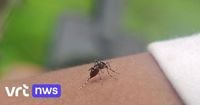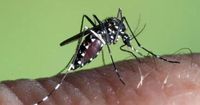The Flemish Department of Public Health has launched a new campaign to minimize the spread of the tiger mosquito, an invasive species that poses potential health risks. Under the slogan "Leg de tijgermug droog" (Dry out the tiger mosquito), residents are encouraged to remove breeding sites and report sightings of this mosquito, which has been spreading across Europe in recent decades.
As of May 8, 2025, the campaign aims to address the growing concern surrounding the tiger mosquito, which has been found in 21 municipalities throughout Flanders over the past three years. This aggressive insect is known to transmit tropical diseases such as dengue, chikungunya, and zika. Fortunately, the likelihood of these viruses circulating in Belgium remains low at present, but officials emphasize the importance of controlling the tiger mosquito population to keep it that way.
Joris Moonens, a spokesperson for the Flemish Department of Public Health, highlighted the campaign's practical focus. "This can be as simple as emptying a flowerpot or changing a bird bath," he explained. The campaign encourages residents to check their gardens and balconies weekly from May to October for any stagnant water where mosquitoes might breed. Additionally, covering rain barrels with lids or mosquito nets is recommended to prevent breeding.
Travelers are also advised to take precautions against inadvertently transporting tiger mosquitoes in their cars or luggage. The department urges citizens to report any sightings of the tiger mosquito through its dedicated platform, which can be accessed at www.muggensurveillance.be. This mosquito can be identified by its distinctive black and white striped pattern and is smaller than the common house mosquito, measuring about four to five millimeters in length.
While the current risk of illness from the tiger mosquito in Belgium is considered low, the potential for change exists. The tiger mosquito is aggressive and bites during the day, making it crucial for residents to remain vigilant. The campaign is in collaboration with various organizations, including the Nature and Forest Agency, Health Makers, Sciensano, and the Institute for Tropical Medicine.
In addition to the practical measures, the campaign aims to educate the public about the importance of mosquito control. The municipalities of Evergem, Melle, Wondelgem, Hoegaarden, Puurs-Sint-Amands, Kessel-Lo, Wilrijk, Lebbeke, and Wolfsdonk have been identified as areas with suspected overwintering and establishment of the tiger mosquito.
As the mosquito season begins, the Flemish Department of Public Health is taking proactive steps to combat the spread of this invasive species. The campaign not only seeks to reduce the annoyance caused by the tiger mosquito but also aims to prevent the potential spread of serious diseases that could affect public health.
Residents are encouraged to take action by regularly checking their properties for stagnant water, reporting any sightings, and sharing information with neighbors. The slogan "Leg de tijgermug droog" serves as a reminder that simple actions can have a significant impact on controlling the mosquito population.
As summer approaches, the public's participation in this campaign will be vital. By working together, the community can help minimize the risks associated with the tiger mosquito and protect public health. The department is hopeful that increased awareness and proactive measures will lead to a decrease in mosquito populations and a lower risk of disease transmission.
In summary, the tiger mosquito poses a significant challenge for Flanders, but through community engagement and awareness, the spread of this invasive species can be curtailed. Residents are urged to stay informed and take the necessary steps to keep their environments mosquito-free.





